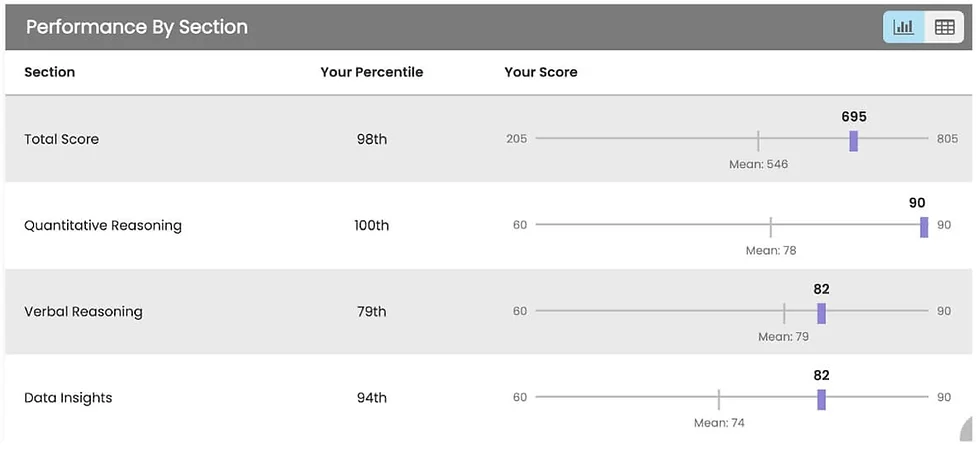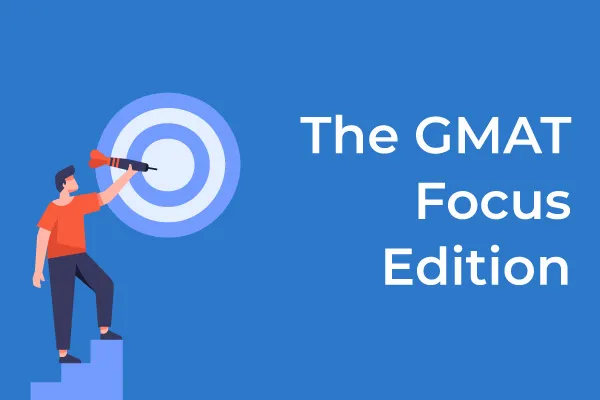As per GMAC, the institution behind the GMAT, achieving a score of 705 on the GMAT Focus Edition is anticipated to correspond roughly to a 750 on the traditional GMAT. Essentially, GMAC anticipates that scoring 705 will place test-takers in the 98th percentile, surpassing the average scores of most business schools. Nonetheless, many individuals are interested in strategies for attaining a score of 705 or higher on the GMAT Focus Edition.
There are several motives driving the desire to achieve a score of 705 or above. One reason is the ingrained perception of 700 as a significant benchmark score on the GMAT. Therefore, despite the altered scoring system of the new GMAT version, individuals still aspire to reach the 700+ range. Another factor contributing to this aspiration is the likelihood that GMAC’s projections for Focus Edition scores may prove to be somewhat conservative. Consequently, a score of 705 might translate to a percentile ranking lower than the 98th and potentially align more closely with the average scores of elite MBA programs, akin to a score of 730.
In this article, I will delve into strategies for achieving a score of 705 or higher on the GMAT Focus Edition. I will address the performance required to reach this target, offer tips for enhancing accuracy significantly, and provide additional insights.
The GMAT Focus Performance for 705+
Understanding the performance required to attain a specific score is crucial for achieving that goal. You might also be curious about the level of difficulty in achieving a score of 705 or higher on the GMAT Focus Edition. Therefore, let’s explore the type of performance necessary to reach this target.
Section Scores Needed for Scoring 705
Calculating the Section Scores Required for a 705 Score
To gauge the performance necessary for scoring 705 or above on the GMAT Focus Edition, we can utilize the following formula for computing GMAT Focus scores:
(“Quant,” “Verbal,” and “Data Insights” denote the three section scores ranging from 60 to 90.)

Then, since 255/3 = 85, we see that we can score 705 on the GMAT Focus Edition by scoring 85 on each of the three sections of the test.
Number of Correct Questions Needed to Score 705 on the GMAT Focus Edition
To achieve a score of 705 or higher on the GMAT Focus Edition, it’s essential to secure a minimum of 85 points in each section. This typically translates to answering nearly all questions correctly in each section, with a margin allowing for a few errors, particularly in the more challenging questions. While exact numbers may vary until more official score reports are available, a rough estimate suggests approximately 18 out of 21 Quant questions, 20 out of 23 Verbal questions, and 17 out of 20 Data Insights questions need to be answered correctly to attain scores of Q85, V85, and DI85 respectively. This sums up to approximately 55 correct responses out of 64 questions overall, or around 86% accuracy.
It’s worth noting that other combinations of section scores can also yield a total score of 705, such as Q90, V83, and DI82. However, regardless of the specific score breakdown, achieving a 705+ score entails getting around 86% of the questions correct.
To prepare effectively for such high performance on the GMAT Focus Edition, here are some key strategies:
Tip 1: Master Topics Methodically:
Focus on mastering one topic at a time, starting with understanding the concepts and strategies involved. Practice questions related to the topic untimed initially to build a strong foundation, then gradually increase the pace to match test conditions.
Tip 2: Learn Topics Thoroughly:
Understand topics from the ground up, going beyond memorization to grasp the logical foundations behind concepts, formulas, and strategies. This deeper understanding enhances retention and enables flexible application of knowledge.
Tip 3: Practice with High Accuracy and Streaks:
Aim for high accuracy levels in practice sessions, striving for nearly perfect scores on easy and medium questions and maintaining at least 70% accuracy on hard questions. Utilize the streaks method, aiming for long sequences of correct answers to build consistency and confidence.
By following these strategies diligently, test-takers can enhance their chances of achieving a score of 705 or higher on the GMAT Focus Edition.
Tip 4: Utilize Multiple Approaches When Answering Quant Practice Questions
The GMAT assesses not only mathematical proficiency but also problem-solving skills. Quant questions are designed to evaluate your ability to devise effective strategies for problem-solving. Hence, it’s crucial to approach Quant questions with a flexible mindset. For instance, a problem involving determining the number of apples sold by a vendor might not solely rely on algebraic methods; alternative approaches like using constraints from the question or analyzing answer choices might be necessary. Developing proficiency in various problem-solving approaches enhances your performance on GMAT Quant. Practicing Quant questions using multiple methods, such as algebraic solving, numerical substitution, and working backward from answer choices, allows you to adapt to diverse question types effectively. Even when uncertain about the solution method, persist with the question and devise alternative approaches. This practice cultivates the ability to generate strategies spontaneously, enabling fluid problem-solving during the exam.
Enhance your problem-solving skills by answering Quant practice questions using multiple approaches.
Tip 5: Employ Sophisticated Thinking in Verbal Questioning
Scoring 705+ on the GMAT Focus Edition mandates achieving high accuracy across all sections, including Verbal. Success in Verbal hinges not only on answering easy and medium questions but also on mastering hard ones. Sophisticated thinking is imperative for tackling complex Verbal questions effectively. While simple reasoning may suffice for easier questions, adeptly navigating through harder ones necessitates discerning subtle logical nuances and establishing unconventional connections between ideas. To cultivate this skill, engage in untimed practice sessions for Verbal questions. Thoroughly comprehend passages and meticulously evaluate each answer choice, discerning its relationship with the passage content or its impact on the scenario presented.
For further insights on employing sophisticated thinking in Verbal questions, refer to my comprehensive guide on mastering GMAT Verbal. Your Verbal score on the GMAT is reflective of the sophistication of your thinking during question answering.
Tip 6: Prioritize Flawless Execution for High Performance in Data Insights
Excellence in executing tasks is pivotal for success across all sections of the GMAT, with particular emphasis on Data Insights. Data Insights questions demand meticulous attention to detail to prevent errors stemming from misinterpretation or oversight. Some questions may require identifying multiple correct answers, while others involve synthesizing information from various sources. Achieving mastery in Data Insights, essential for obtaining near-perfect scores, necessitates honing flawless execution skills. During practice sessions, exercise utmost caution in accuracy by meticulously attending to minor details. Ensure precise interpretation of questions, thorough examination of answer choices, and accurate interpretation of graphical or tabular data. Methodically approach Multi-Source reasoning questions, adhering to a systematic process with precision at each step. The impact of meticulous execution on your Data Insights score cannot be overstated, as it reflects your proficiency in flawlessly completing multi-step tasks. Strive for flawless execution to excel in the Data Insights section of the GMAT.




